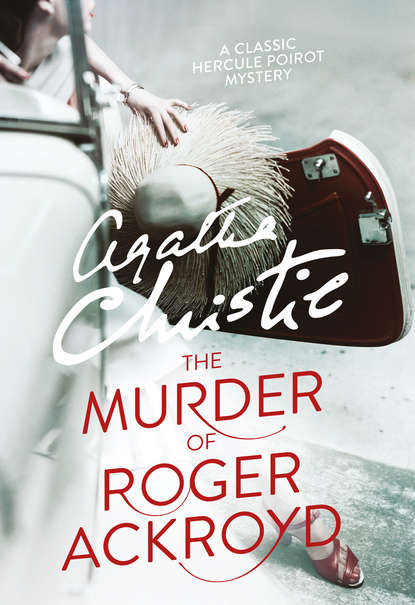По всем вопросам обращайтесь на: info@litportal.ru
(©) 2003-2024.
✖
The Murder of Roger Ackroyd
Автор
Год написания книги
2019
Настройки чтения
Размер шрифта
Высота строк
Поля
And still—silence. Not a sign of life from within the locked room. Parker and I glanced at each other.
“Look here, Parker,” I said, “I’m going to break this door in—or rather, we are. I’ll take the responsibility.”
“If you say so, sir,” said Parker, rather doubtfully.
“I do say so. I’m seriously alarmed about Mr Ackroyd.”
I looked round the small lobby and picked up a heavy oak chair. Parker and I held it between us and advanced to the assault. Once, twice, and three times we hurled it against the lock. At the third blow it gave, and we staggered into the room.
Ackroyd was sitting as I had left him in the armchair before the fire. His head had fallen sideways, and clearly visible, just below the collar of his coat, was a shining piece of twisted metalwork.
Parker and I advanced till we stood over the recumbent figure. I heard the butler draw in his breath with a sharp hiss.
“Stabbed from be’ind,” he murmured. “’Orrible!”
He wiped his moist brow with his handkerchief, then stretched out a gingerly hand towards the hilt of the dagger.
“You mustn’t touch that,” I said sharply. “Go at once to the telephone and ring up the police station. Inform them of what has happened. Then tell Mr Raymond and Major Blunt.”
“Very good, sir.”
Parker hurried away, still wiping his perspiring brow.
I did what little had to be done. I was careful not to disturb the position of the body, and not to handle the dagger at all. No object was to be attained by moving it. Ackroyd had clearly been dead some little time.
Then I heard young Raymond’s voice, horror-stricken and incredulous, outside.
“What do you say? Oh! impossible! Where’s the doctor?”
He appeared impetuously in the doorway, then stopped dead, his face very white. A hand put him aside, and Hector Blunt came past him into the room.
“My God!” said Raymond from behind him; “it’s true, then.”
Blunt came straight on till he reached the chair. He bent over the body, and I thought that, like Parker, he was going to lay hold of the dagger hilt. I drew him back with one hand.
“Nothing must be moved,” I explained. “The police must see him exactly as he is now.”
Blunt nodded in instant comprehension. His face was expressionless as ever, but I thought I detected signs of emotion beneath the stolid mask. Geoffrey Raymond had joined us now, and stood peering over Blunt’s shoulder at the body.
“This is terrible,” he said in a low voice.
He had regained his composure, but as he took off the pince-nez he habitually wore and polished them I observed that his hand was shaking.
“Robbery, I suppose,” he said. “How did the fellow get in? Through the window? Has anything been taken?”
He went towards the desk.
“You think it’s burglary?” I said slowly.
“What else could it be? There’s no question of suicide, I suppose?”
“No man could stab himself in such a way,” I said confidently. “It’s murder right enough. But with what motive?”
“Roger hadn’t an enemy in the world,” said Blunt quietly. “Must have been burglars. But what was the thief after? Nothing seems to be disarranged?”
He looked round the room. Raymond was still sorting the papers on the desk.
“There seems nothing missing, and none of the drawers show signs of having been tampered with,” the secretary observed at last. “It’s very mysterious.”
Blunt made a slight motion with his head.
“There are some letters on the floor here,” he said.
I looked down. Three or four letters still lay where Ackroyd had dropped them earlier in the evening.
But the blue envelope containing Mrs Ferrar’s letter had disappeared. I half opened my mouth to speak, but at that moment the sound of a bell pealed through the house. There was a confused murmur of voices in the hall, and then Parker appeared with our local inspector and a police constable.
“Good evening, gentlemen,” said the inspector. “I’m terribly sorry for this! A good kind gentleman like Mr Ackroyd. The butler says it’s murder. No possibility of accident or suicide, doctor?”
“None whatever,” I said.
“Ah! A bad business.”
He came and stood over the body.
“Been moved at all?” he asked sharply.
“Beyond making certain that life was extinct—an easy matter—I have not disturbed the body in any way.”
“Ah! And everything points to the murderer having got clear away—for the moment, that is. Now then, let me hear all about it. Who found the body?”
I explained the circumstances carefully.
“A telephone message, you say? From the butler?”
“A message that I never sent,” declared Parker earnestly. “I’ve not been near the telephone the whole evening. The others can bear me out that I haven’t.”
“Very odd, that. Did it sound like Parker’s voice, doctor?”
“Well—I can’t say I noticed. I took it for granted, you see.”
“Naturally. Well, you got up here, broke in the door, and found poor Mr Ackroyd like this. How long should you say he had been dead, doctor?”
“Half an hour at least—perhaps longer,” I said.
“The door was locked on the inside, you say? What about the window?”
“I myself closed and bolted it earlier in the evening at Mr Ackroyd’s request.”

















